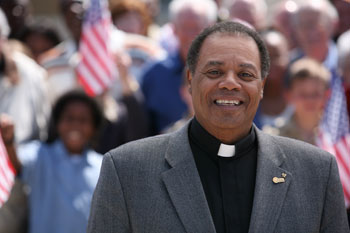Chris Good of The Atlantic magazine put it plainly: “It was a big weekend for fiscal conservatives and Tea Partiers, not just in one state, but for the whole movement in America.” Good’s comments were penned two weeks before Rand Paul’s astonishing Republican primary victory over the Washington, D.C.-anointed Trey Grayson in the Kentucky U.S. Senate primary, which put an exclamation point on the comment.
Most national news sources touted Dr. Paul’s May 18 victory by a 59-35 margin as the latest stunning victory of the Tea Party movement. Dr. Paul didn’t shy away from that characterization either. “I have a message, a message from the Tea Party,” Paul said in his victory speech, “We’ve come to take our government back.”
On paper, there’s no reason why Rand Paul should have been the Republican nominee. Though long active in Kentucky issue politics, he had never held or run for elective office and was always the outsider. He was virtually unknown outside of his Bowling Green hometown. On the other hand, Trey Grayson had held statewide office as Secretary of State for six years and enjoyed the backing of all of the Washington establishment. Grayson had been endorsed by former Vice President Dick Cheney, former New York City Mayor Rudy Giuliani, Kentucky Congressman Hal Rogers, and former U.S. Senator Rick Santorum. Most importantly, Grayson also had the explicit endorsement of Senate Minority Leader Mitch McConnell, the other U.S. Senator from Kentucky, and access to his immense fundraising machine.
But it may have been the vicious Washington-based opposition to Paul’s Tea Party-fueled campaign that made the difference for Paul and was Grayson’s undoing. Focus on the Family’s Dr. James Dobson reversed his endorsement of Grayson on May 6 after what he reported was an untruthful whispering campaign in Washington against Paul. Dobson told Kentucky voters, “Senior members of the GOP told me Dr. Paul is pro-choice and that he opposes many conservative perspectives, so I endorsed his opponent.” After interviewing Dr. Paul in person and finding that the Bowling Green ophthalmologist was solidly pro-life, Dobson announced he had made an “embarrassing mistake.”
The Lexington Herald-Leader explained in a May 9 endorsement of Paul, “If you want to continue along the path paved in recent years by former  President George W. Bush, Cheney and McConnell, Trey Grayson is your man…. If you want to alter the party’s course, vote for Rand Paul.” Kentucky Republican primary voters favored the latter.
President George W. Bush, Cheney and McConnell, Trey Grayson is your man…. If you want to alter the party’s course, vote for Rand Paul.” Kentucky Republican primary voters favored the latter.
The Atlantic magazine’s Chris Good, mentioned above, was writing about the Republican rejection of the establishment incumbent Senator Robert Bennett of Utah at a state nominating convention May 8: “Bennett wasn’t just edged out, either. He went down in flames. He only made it to the second round of voting, and collected 26.59 percent of the vote, placing third as [Mike] Lee and [Tim] Bridgewater went on to the final round. A GOP incumbent could be expected to make it to the last round of voting. Not so.” Both Lee and Bridgewater ran to the right of Bennett. And because only the top two vote-winners are entitled to have their names on the June 26 GOP primary ballot, Bennett will not be on the November ballot in this overwhelmingly Republican state.
Bennett’s unseating was likewise politically unprecedented. The three-term Republican Senator didn’t even have primary opposition last time he ran for reelection in 2004. Bennett was a political legacy; his maternal grandfather was president of the LDS Church in this overwhelmingly Mormon state and his father was also a U.S. Senator. Former (and possibly future) presidential contender Mitt Romney campaigned for him at the caucus, as did former Senator Jake Garn and former House Speaker Newt Gingrich. After Bennett’s loss, the establishment media made a habit of calling Bennett a “conservative,” despite the fact that he voted in favor of the TARP bailout bill under the Bush administration.
And that TARP vote was probably what made the difference. Election results and polls thus far have revealed that congressional candidates who have favored bailouts are having a difficult time with voters.
This may be why Florida’s incumbent Governor Charlie Crist bailed out of the Republican Senate primary back on April 29 despite an overwhelming advantage in fundraising and almost universal statewide name recognition. Crist had also backed Obama’s “stimulus” bailout, famously embracing Obama at a public rally in support of the bailout, and his Republican opponent Florida House Speaker Marco Rubio pounced upon the issue.
House Speaker Nancy Pelosi once famously called the Tea Party movement “astroturf,” i.e., a phony populist movement being run by the National Republican Party machinery:
What they want is a continuation of the failed economic policies of President George Bush which got us in the situation we are in now. What we want is a new direction…. This [Tea Party] initiative is funded by the high end — we call it astroturf, it’s not really a grassroots movement. It’s astroturf by some of the wealthiest people in America to keep the focus on tax cuts for the rich instead of for the great middle class.
And while it is true that the Washington, D.C.-based Republican establishment would like to be running the Tea Party movement, events in Kentucky, Florida, and Utah have demonstrated that this isn’t yet happening. Moreover, the “Tea Party” is no longer considered “astroturf” by even its most dogged opponents like Nancy Pelosi. But the question is, does the Tea Party movement have the power to give some candidates a chance this year in otherwise impossible districts?
 John Dennis vs. Nancy Pelosi
John Dennis vs. Nancy Pelosi
One of those cases is the race against Pelosi herself by California’s John Dennis, an ergonomics company founder and founder of the San Francisco chapter of the Republican Liberty Caucus. Dennis’ positions closely match his mentor, Texas Republican Ron Paul, for whose presidential campaign he volunteered in 2008. Dennis wants to downsize the federal government; he has called for a balanced budget and the abolition of the Education, Commerce, and Agriculture Departments. On foreign policy, Dennis supports ending the Iraq and Afghan wars and bringing the troops home from foreign bases.
Despite an appealing platform and a campaign that has attracted national attention and more than $500,000 in campaign donations, Dennis wouldn’t have a shot in any other election year. Turning out a sitting Speaker of the House used to be a near impossibility politically. It hadn’t happened even once during the nearly 130 years between 1860 and 1989. Then in 1989 Republican investigations of the ethics violations of Speaker Jim Wright led to his resignation. And in 1994, the backlash against the Clinton spending and healthcare agenda ousted Democratic House Speaker Tom Foley, a 30-year veteran of the House. In 2007, after the 2006 groundswell against Republican out-of-control spending swept the Democrats into control of the House, embattled Republican House Speaker Dennis Hastert announced his resignation from the House. Why? Three Republicans had already announced primary challenges against the big-spending Republican Speaker by the time he announced his “retirement.”
Of course, both Jim Wright’s and Tom Foley’s districts had trended from Democratic leaning to evenly matched districts over the years. Nancy Pelosi’s district, however, remains overwhelmingly Democratic and both John Dennis and the establishment Republican candidate, Dana Walsh, are running as Republicans. Barack Obama beat John McCain 85-12 in the San Francisco district back in 2008. On the plus side, neither Dennis nor Walsh lack fundraising abilities. Both have raised more than $500,000 before the primary, and are running in a year that has tended to favor political candidates outside of the Washington establishment. And Pelosi’s favorability ratings in polls have plummeted nationwide.
Walsh is the Republican picked by the Washington, D.C., crowd to run against Pelosi. She is a foreign policy interventionist, and has put up a JohnDennisExposed.com website attempting to refute Dennis’ principled foreign policy of non-interventionism. Dennis’ non-interventionism would clash with Pelosi’s support for Obama’s wars and overseas meddling. Though the Wall Street Journal has labeled Dennis’ foreign policy views “left-leaning,” this could play to Dennis’ advantage in the left-leaning district.
Economically, Dennis’ primary opponent Walsh postures as a conservative by calling for a balanced budget, but outlines few specifics on what should be cut to actually balance the budget. Walsh’s “small government” rhetoric appears to be nothing more than that — stale cookie-cutter Republican Party talking points about cutting waste and pork barrel spending. Thus, it’s not surprising that Walsh’s run against Pelosi in 2008 netted just an eight percent vote at the polls, a third place-rating that won fewer votes than independent peace candidate Cindy Sheehan. Dennis is a longshot, but … he does have a shot at unseating Pelosi, especially if some new scandal rears itself in the long months before November.
Art Robinson vs. Peter DeFazio
Constitutional-oriented candidate Art Robinson is attempting to unseat ultra-leftist Representative Peter DeFazio from Oregon’s 4th District seat.  Robinson’s website touts him as “an expert on energy and widely known for his petition signed by more than 31,000 American scientists exposing human-caused global warming as a fraud.” Robinson has just prevailed in a Republican primary over fellow constitutionalist Jaynee Germond, who ran as a Constitution Party candidate against DeFazio in 2008.
Robinson’s website touts him as “an expert on energy and widely known for his petition signed by more than 31,000 American scientists exposing human-caused global warming as a fraud.” Robinson has just prevailed in a Republican primary over fellow constitutionalist Jaynee Germond, who ran as a Constitution Party candidate against DeFazio in 2008.
Except for the fact that DeFazio is an entrenched 12-term incumbent, he really doesn’t fit ideologically in this otherwise politically competitive district. Obama won the district by a mere two percent above the national average in 2008, and DeFazio has campaigned against Obama’s stimulus from the Left for containing too many tax cuts and not enough spending. This may be the year DeFazio can be picked off.
DeFazio wisely didn’t vote for Obama’s “stimulus” bill, but why he opposed the spending bill may overcome the impact of the vote itself. He’s a member of the House Progressive Caucus, and his frequent criticism of the Obama administration from the Left led him to nearly vote against the healthcare bill because it wasn’t leftist enough.
Robinson, however, says he would fight to eliminate many government programs and “require that every Congressional action conform to the U.S. Constitution in every respect.” He is a non-interventionist on foreign policy: “I oppose the current situation wherein American soldiers are quartered in more than 100 countries and frequently interfere in the affairs of those countries.”
Robinson appears to have substantial fundraising abilities, raising more than $230,000 in the primary season — more than 10 times his Republican primary opponent. Robinson has a decent shot of taking the entrenched DeFazio out in November.
 Star Parker vs. Laura Richardson
Star Parker vs. Laura Richardson
Star Parker is the Republican seeking to unseat two-term representative Laura Richardson in California’s 37th Congressional District. Richardson is a reliably liberal Congressman in a strongly democratic-leaning district comprising parts of Long Beach and Compton. How strongly democratic? Obama won the election in 2008 by a four-to-one margin.
All conventional political wisdom says that Parker can’t win this race in such a solidly Democratic district made up mostly of ethnic minorities, but that was the same political wisdom that had put Grayson and Bennett as shoo-ins just a few months ago. Parker has a few advantages: She has national name recognition as an author and widely broadcast commentator. She is a black woman herself in this heavily black district. She should have the ability to raise sufficient campaign contributions for a professional campaign. And Parker’s opponent Richardson has seen her share of controversy lately, having her sub-prime property in Sacramento foreclosed upon and auctioned off by the bank. The property — originally purchased for a sub-prime, no money down loan from the now-bankrupt Washington Mutual — had been declared a “public nuisance” for safety code violations. Richardson owns two other homes on which she has also defaulted. Parker could make this a campaign issue. In an era when the nation is going bankrupt with heavy debt, a Congressman who can’t manage her own personal debt should not be put in the position of managing the nation’s finances.
A former single mother on welfare, Parker converted to Christianity, put her life back together, and founded the Center for Urban Renewal and Education. Like her public activism thus far, Parker’s campaign focuses exclusively upon the effort to pull black people out of the welfare dependency trap. “The barrier between America’s chronically poor and the American dream is the welfare state socialism,” Parker says. That means ending the federal welfare state and federal bailouts of corporations, cuts in federal spending, and a restoration of true free enterprise. Her foreign policy views, however, are mostly a mystery. Parker is still an underdog in this overwhelmingly Democratic district, but she could pull off an upset with a sufficient national backlash against big spending in Washington.
Stephen Broden vs. ?Eddie Bernice Johnson
Stephen Broden is likewise in a battle with an entrenched congressional leftist, Texas Democrat Eddie Bernice Johnson. Broden won the March 2  Republican primary with 68 percent of the vote in this overwhelmingly Democratic district. The Dallas-based district is a majority-minority district, with more than two-thirds of voters being black or Hispanic. Both Johnson and Broden are black, but the advantage in any ordinary political year is so strongly toward the Democratic incumbent that a Republican wouldn’t stand a chance in this district. This is not shaping up to be an ordinary year, however.
Republican primary with 68 percent of the vote in this overwhelmingly Democratic district. The Dallas-based district is a majority-minority district, with more than two-thirds of voters being black or Hispanic. Both Johnson and Broden are black, but the advantage in any ordinary political year is so strongly toward the Democratic incumbent that a Republican wouldn’t stand a chance in this district. This is not shaping up to be an ordinary year, however.
Broden is senior pastor of the Dallas-based Fair Park Bible Fellowship and a fiscal and cultural conservative, which is the focus of his campaign. “There can be no doubt that there is a diminishing of our freedoms through the deliberate expansion of government over our lives,” Broden explains on his campaign website. “The trend towards big government started in the twentieth century through the crisis of 1929 and the implementation of the ‘New Deal.’ This plan began the slow spiral down the path of expanded government and soft tyranny. The greatest rhythm for expanded government came in the 1960’s with the Great Society program.” Broden says, “When I go to our nation’s capitol I will seek to return our nation to those founding principles that limit government and also to our Judeo-Christian heritage that made us great.”
Broden raised only $118,537 in campaign contributions for the primary season, according to FEC records, and will have to demonstrate better financing prowess to be able to capitalize on the national Tea Party sentiment and Eddie Bernice Johnson’s unpopular votes for both the Bush bailout and Obama’s “stimulus” bill.
* * *
The “Tea Party” revolution against higher taxes and big spending has not always been consistent or informed. In Massachusetts earlier this year, voters chose liberal Republican Scott Brown in reaction to the perceived bigger spending Democrats. But events in Kentucky, Utah, and Florida are a strong indication that 2010 will not just be an anti-incumbent year. Rather, it may be the year where votes for bailouts 18 months ago are toxic to incumbents. And many constitutionally oriented candidates are waiting in the wings to take advantage of what appears to be a looming political tsunami.
— Thumbnail photo of Rand Paul: AP Images